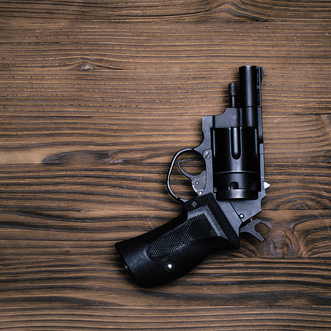After lawyers charged for waving guns at protesters, Missouri attorney general plans to intervene

Image from Shutterstock.com.
Husband and wife lawyers Mark and Patricia McCloskey were each charged with unlawful use of a weapon Monday for waving guns at protesters outside their St. Louis home last month. The Missouri governor and attorney general opposed the charges.
Gov. Mike Parson said he would likely pardon the personal injury attorneys, while Missouri Attorney General Eric Schmitt said he would enter the case and seek dismissal of the charges, the St. Louis Post-Dispatch reports.
Patricia McCloskey was armed with a semi-automatic handgun, while Mark McCloskey had a semi-automatic rifle, according to criminal complaints and probable cause statements (here and here).
The St. Louis Post-Dispatch, NPR, the Washington Post and KSDK have coverage.
The McCloskeys violated the law by knowingly exhibiting guns capable of lethal use “in an angry or threatening manner,” according to the complaints.
St. Louis Circuit Attorney Kimberly Gardner said in a statement that it is illegal to wave weapons in a threatening manner at those engaged in a nonviolent protest. She is recommending that the McCloskeys participate in a diversion program.
Schmitt tweeted that Gardner had engaged in “a political prosecution,” and the McCloskeys had a Second Amendment right to defend themselves.
Parson called the charges outrageous on Twitter. In a radio interview Friday, Parson said he would probably pardon the McCloskeys if they are convicted, the St. Louis Post-Dispatch previously reported.
The protesters were on their way to Mayor Lyda Krewson’s home. Mark McCloskey previously told KMOV4 that the protesters had broken an iron gate to the private street in their neighborhood, and “it was like the storming of the Bastille.”
“I was terrified that we’d be murdered within seconds,” he said. “Our house would be burned down, our pets would be killed.”
The couple’s current lawyer, Joel Schwartz, said in a statement the charges “are disheartening as I unequivocally believe no crime was committed.”
“I, along with my clients, support the First Amendment right of every citizen to have their voice and opinion heard. This right, however, must be balanced with the Second Amendment and Missouri law, which entitle each of us to protect our home and family from potential threats,” Schwartz said.
NPR and KSDK published the statement.
Law professors have differed over whether the McCloskeys were protected by Missouri’s castle doctrine, which is discussed in an article by LawandCrime.com.
The law says a person may, with some exceptions, use physical force to the extent that the person reasonably thinks such force is necessary to defend against “the use or imminent use of unlawful force by such other person.”
The law also says a person does not have a duty to retreat from private property owned or leased by the individual or from any location where the person has a right to be.
Ronald Sullivan Jr., a professor at Harvard Law School, told the Washington Post that the law doesn’t protect the McCloskeys.
“The law is crystal clear in Missouri, that a reasonableness argument is necessary for a defendant to take advantage of the castle doctrine,” Sullivan said. “The defendant has to be reasonably afraid of being in imminent danger.”
The argument that the protesters were in a private neighborhood doesn’t change the result, Sullivan told the Washington Post.
“The castle doctrine would still be unavailable,” Sullivan said. “The doctrine removes one’s duty to retreat. But they could only use deadly force if they reasonably felt they were in imminent danger. Based on the video evidence [showing unarmed protesters], that’s a very difficult argument to make.”
Write a letter to the editor, share a story tip or update, or report an error.


